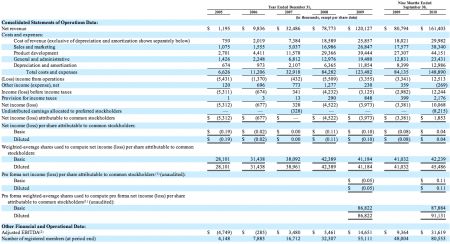57 Meditations on Kicking @$$ in Business and Life"4.8/5 stars" on Amazon
12 Of My Favorite Quotes on Success
Tweet 1 CommentI got positive feedback from the Awesome Chinese Proverbs posting and have since been looking out for other good quotes and sayings in various categories.
This posting of quotes on success was inspired by “Vegas Steve” — thanks for the inspiration from your Dare to Dream collection of quotes!

1) “Eighty percent of success is showing up.” — Woody Allen
2) “Many of life’s failures are people who did not realize how close they were to success when they gave up.” — Thomas A. Edison
3) “Once you make a decision, the universe conspires to make it happen.” — Ralph Waldo Emerson
4) “Whenever I hear, ‘It can’t be done,” I know I’m close to success.” — Michael Flatley
5) “Losers visualize the penalties of failure. Winners visualize the rewards of success.” — Dr. Rob Gilbert
6) “Success is not the result of spontaneous combustion. You must set yourself on fire.” — Reggie Leach
7) “Always bear in mind that your own resolution to succeed is more important than any one thing.” — Abraham Lincoln
8) “Victorious warriors win first and then go to war, while defeated warriors go to war first and then seek to win.” — Sun-tzu
9) “You may have to fight a battle more than once to win it.” — Margaret Thatcher
10) “If you get up the courage to begin, you have the courage to succeed.” — David Viscott
11) “Success is simply a matter of luck. Ask any failure. — Earl Watson
12) “Success is peace of mind which is a direct result of self-satisfaction in knowing that you did your best to become the best that you are capable of becoming.” — John Wooden
If you want to see all the lists of quotes I’m compiling, you can click my Quotes section.
1 comment so far | Continue Reading »
Thursday, March 3rd, 2011
6 Easy Tools To Help You Name Stuff On The Web
Tweet 7 CommentsBelow are six good ones I’ve used.
Naming Ideas: Where To Start?
I think Google’s Keyword Tool is a great place to start as it provides you with the # of monthly searches being made for certain words/phrases.
Let’s pretend that I’m interested in naming a business that deals in “personality types” — type that into the search box.

7 comments so far (is that a lot?) | Continue Reading »
Tuesday, March 1st, 2011
How To Easily Set Up A (Small) Web Site
Tweet 6 Comments
I decided to share the advice I’m giving Anita with you…in case you or friends need it (and Anita was cool with this — she’s reading it here just like you!).
Now, Anita is her real first name, but since Anita hasn’t named her Web site yet (and she may name it after herself), let’s make up a last name for Anita and call her Anita “Smith.”
A Few Basic Questions To Anita First
Anita outlined most of her needs in the three questions/requirements she sent me towards the bottom of this article; but I had a few more answers I needed first — so we started off with me asking her a few questions:
Rob: Do you want a Web site to just work out of the box or do you have some resources for customization?
Anita: I’m not very technical but I can get tap into a person who is familiar with Web sites.
Rob: What’s your budget?
Anita: I have a few thousand bucks (U.S.) I could put into creating a Web site.
Rob: What’s your tming?
Answer: I’d like to have the site up and running within 3 to 6 months.

Rob: What is the purpose of the site in just a few words
Anita: Legitimacy. I need a place to send people to that looks professional.
Now here are Anita’s three questions/requirements:
How do I set up a website — I don’t have a domain name, but I have several ideas of what I want. (A cheap host would be great.). I only work in the nonprofit sector, so something appropriate for that.
I want this web page to be a place where I can describe my services and send prospective clients. She mentioned that she wants to link it with some current clients who have sponsored major projects she’s done.
And she said:
“I probably want to be able to post some free instructional materials as well or again just link folks to a source for those free materials…I might want to post some examples of my work or the work of my trainees.”
I want to ditch my AOL address… and have an email address that is connected to the new site, and I want to convert my current address book to the new address and inform all my contacts of the change. (I have a feeling that is sort of a basic thing, but it will also be a marketing strategy on my part).
Based on those simple needs, I made the following recommendations (in this order):
1) Name Your New Web Site
I suggest that the first thing you do is pick a domain name.
My preferred service for this is GoDaddy because it’s easy, relatively affordable and they have the best customer support of any domain registry/hosting company I know — you can call them on the phone 24/7).
Anita has some name recognition in her industry (so potential clients/partners will be searching “Anita Smith” on Google — I suggested she first focus on seeing if her exact name is available as a .com, .net or .org — I did a quick check of this using Go Daddy’s Bulk Name Registration (go to GoDaddy.com and click Domains and then Bulk Name Registration).
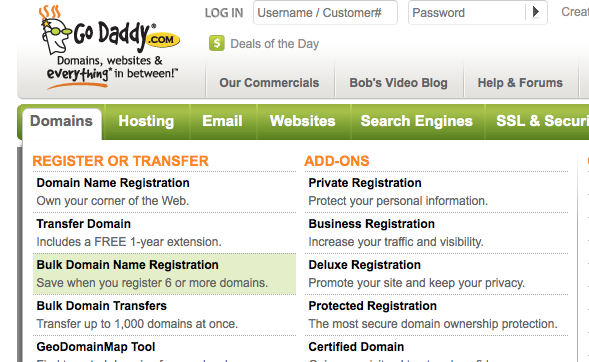
Then you get a search box like this where you can enter multiple names at once:
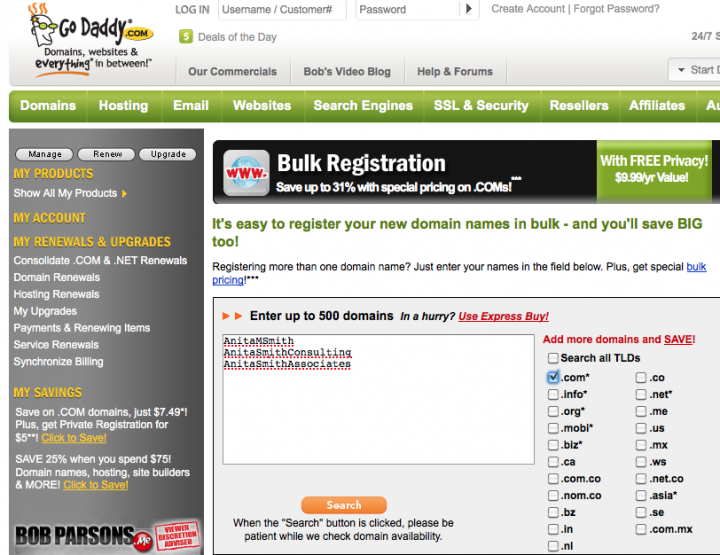
I suggested she try adding her middle initial and also try adding her full name followed by a keyword associated with her business (I mentioned this approach in 7 Tips To Get Your Site On The Front Page Of Google When People Search Your (Common) Name)).
With Anita’s name, the middle initial felt best for her so we decided on using that, though it was nice to know that other names were available such as:
- AnitaSmithConsulting and
- AnitaSmithAssociates
If you want a useful tool to help you brainstorm names, I suggest you read Six Easy Tools To Help You Name Stuff On The Web (it includes domain suggestion tools) and start with the Google Keyword Tool.
Google’s Keyword Tool provides an estimate of the number of monthly searches of different names/phrases — basically, Google is telling you what the demand is for the topic you want to supply to – Supply and Demand is a pretty good place to start with any business, ay?
As example, if you were in the business of non-profit consulting, and you searched that exact term, Google Keyword Tool shows this:
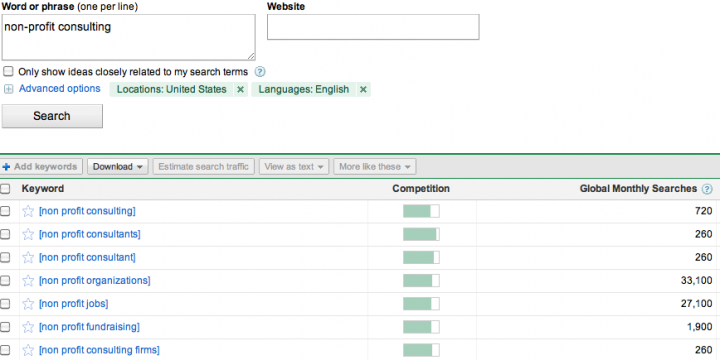
So, Google is estimating that 720 people each month search the exact keyword “non profit consulting” and 260 people search “non profit consultants.” The closer your domain name is to those search terms, the more likely it is that Google will send such a searcher to your new Web site.
2) Get A Host For Your New Web Site
You’ll also need someone to host your Web site somewhere.
I told Anita that GoDaddy is a simple solution for someone with a little budget and her other needs (like having her own custom email addresses (which she asks about below) — and since she’s already buying her domain name through GoDaddy, she can just add the hosting to her shopping cart.
GoDaddy charges are in the range of as low as $2.99 per month (if you pay for 36 months and don’t need much storage) on up to $14.99 per month if you need more storage and a lot more database stuff and only want to pay a month at a time.
You get free email accounts with any of GoDaddy’s hosting options that I’ve looked at.
3) Select A Content Management Platform
For ease of use, I suggest one of the following four.
- WordPress — This is the tool I use for my own Web site
- Posterous — I wrote a piece about them called Posterous May Be The Fastest Way To Blog and their impressive young CEO
- Tumblr — These guys are similar to Posterous
- Yola — Another great tool; its company is headed by my friend Vinny Lingham
All four of them are free, and super-useful, though there may be charges if you use extra storage/features.
Based on the fact that Anita is low-tech and has some budget to spend to build a new Web site, I recommended WordPress; that way she can tap into the numerous WordPress designers out there and save herself some time.
If Anita had asked me for a free and easy solution to create a new Web site, I would have steered her to the other three.
Anita can check out my Check out 7 Easy Steps On How To Set Up A Blog Using WordPress to go through the why’s and what’s of using WordPress.
I’m also a big fan of installing Google Analytics on your Web site — it’s free and will tell you a wealth of information about people visiting your site. Check out 3 Easy Steps To Using Google Analytics.
If Anita picks GoDaddy and WordPress she can also benefit from accessing WordPress through GoDaddy’s interface (as opposed to having a separate log-in for GoDaddy and WordPress).
Regarding Anita’s question about discarding her rather ancient AOL email address, I told her that she will get some free email addresses (e.g. [email protected] or [email protected]) to use through your new hosting account with GoDaddy.
Additionally, she can forward the email she receives at your old AOL email to your new AnitaMSmith email through options on AOL’s email (I don’t use AOL but it should be called something like “Pop/Forwarding” or just “Forward Your Mail.”).
What To Work On After You Set Up Your Web Site
I told Anita that once she’s got her new Web site up and running, she’ll want to focus on two main things to get traffic:
- Providing Quality Content and
- Getting Other Sites To Link To Her
A good place to see the basics on that would be the GoogleJuice Tips section of 9 Simple Tips For Showing Up In Search Results.
Best of luck, Anita!
6 comments so far (is that a lot?) | Continue Reading »
Sunday, February 27th, 2011
7 Tips To Get Your Site On The Front Page of Google When People Search Your (Common) Name
Tweet 2 CommentsA few months ago I was launching my own personal Web site and I had the simple goal of getting it on Google’s front page when people searched my fairly common name: Rob Kelly.
Well, a search of “Rob Kelly” now places me first on Google’s front page.
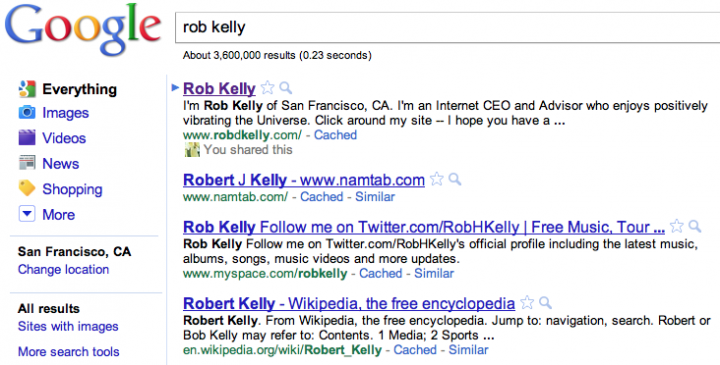
I enjoy sharing learnings from such projects so I decided to deposit some of the knowls that helped get my personal website on Google’s front page right here in this article.
Warning/Alert: If you’re looking for SEO trickery to figure out how to game Google’s search engine, you’ve come to the wrong place! In fact, if that’s you, please leave right now…I don’t want your kind here!
The tips I’m sharing are logical/legitimate approaches to improving your Google website ranking in hopes of getting on the front page of Google in an honest fashion.
Ok, for the rest of you honest folk, let’s do it! …
2 comments so far (is that a lot?) | Continue Reading »
Tuesday, February 22nd, 2011
LinkedIn IPO: Highlights From Their S-1 Filing
Tweet 2 CommentsI’m one of those weird guys who likes to pour through documents like the 182-page LinkedIn S-1 Registration Statement (while flying to Salt Lake City for a trip with high-school buddies!).
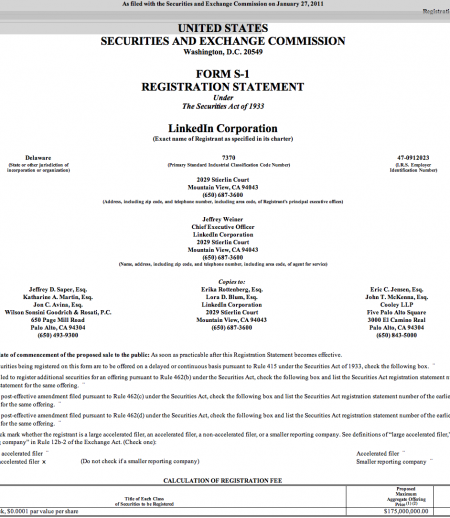
An S-1 is what a company files in preparation for “going public.”
Here are some highlights:
Estimated LinkedIn Revenue & Profits in Calendar 2010
- Revenue: $215 million
- Net Income: $13.4 million*
This excludes what looks like an $8.2 million payout to preferred shareholders
LinkedIn Revenue Growth*
- 2009 to 2010: 99.7% (impressive that they doubled in the last year)
- 2008 to 2009: 53%
- 2007 to 2008: 142%
* 2009 to 2010 reflects just 9 month periods.
LinkedIn Revenue Breakdown By Product Line*
Hiring Solutions: 44% — Recruiters (3,900 of them in 2010) pay LinkedIn to access and market to its database of users. This includes 69% of the Fortune 100.
Advertising: 31% — Marketers (33,000 in 2010) run ads on LinkedIn’s page views.
Subscriptions: 25% — LinkedIn members can use much of LinkedIn for free but there are additional things that users must pay for (such as seeing more than 100 results at a time or being able to filter your searches by seniority of a LinkedIn member).
*Breakdown as of quarter ended Sept. 30, 2010
“LinkedIn is not as automated a business as some may think…over half their revenue comes from Field Sales.”
LinkedIn Revenue By Sales Channel
- Field Sales: 54%
- Online Sales: 46%
Due in part to LinkedIn’s money spent on a sales team in the field, their profit margins are lower than Google’s and Facebook’s.
“I bet that Groupon’s profit margins will be closer to LinkedIn’s than they are to Google or Facbeook when Groupon files its S-1…due to the large field sales team they employ. “
Did anyone notice that I just quoted myself? I’m just trying to break up the text components here!
LinkedIn’s Profit Margins*
- Gross Margin: 81.4%
- Adjusted EBIDTA: 19.6%
- Operating Margin: 7.8%
- Profit Margin: 6.2% (this compares to 28%+ for Google and a rumored 25.7% for Facebook)
* For the 9 months ended Sept. 30, 2010
Interesting Stats On The LinkedIn Database*
- 90 Million+ members
- 1 million+ companies listed
- 2 million+ groups
- 25,000 jobs were posted per week (on average) during 2010
*As of December 31, 2010
LinkedIn Traffic Per Quarter (end of 2010)
- 65 million unique visitors
- 5.5 billion page views
LinkedIn’s International Business
- 27% of net revenues come from outside the U.S.
LinkedIn Valuation
LinkedIn is currently being valued at around $2.9 billion according to the latest shares being sold on SharesPost (note: this is not in the S-1 Registration).
A LinkedIn IPO could value the company at a great price than the $2.9 billion based on those recent privately-traded LinkedIn shares.
Of course, the LinkedIn valuation could change big time if we have an Internet bubble burst before they go public.
2 comments so far (is that a lot?) | Continue Reading »
Monday, February 21st, 2011
A Quick Rework (By 37 Signals) Book Review
Tweet CommentI recently finished reading the book Rework by Jason Fried & David Heinemeier Hansson, the founders of the small but powerful 37 Signals company.
Rework and 37 Signals’ last book (Getting Real) are unique in that they give you a birds eye view on operating a small business (37 Signals has just a few employees) whose products (software for design & productivity) are used by millions.
Here’s a sampling of 5 tips I liked from Rework:
1) The Easiest Product To Make Is One That You Want To Use
The main reason here is that you don’t have to worry about focus groups; you know what the products needs or doesn’t need first-hand.
2) What To Work On First In A New Product
“What’s The Hot Dog In Your Hot Dog Stand?”
I love this quote: Fried & Heinemeier Hansson are suggesting that if you were to start a hot dog stand, the first thing you’d want to work on is the…hot dog (as opposed to the napkins or relish).
I’ve found this hot dog stand analogy to be a simple way to help entrepreneurs figure out where to start on new product creation.
3) What Features To Launch A Product With?
Entrepreneurs face “feature-creep” all the time.
Fried & Heinemeier suggest you ask yourself: If you had to launch your product in 2 weeks, what features would you include?
For example, Crate & Barrel didn’t wait to build fancy displays when they launched their first store (they flipped over “crates and barrels” that the merchandise came in and stacked products on top of them.
4) A Great Quote About Usability:
“Cool wears off, useful never does.”
That’s a good quote I like for erring on the side of usability over coolness with product design.
5) Hire Managers Of One
Fried & Hansson recommend you hire people who set their own goals and execute and don’t need a lot of hand-holding.
This is similar to the “Drivers” (DACI Model) most imperative to getting things done.
One measurement of whether someone is a Manager of One/Driver, the 37 Signals founders say, is that if you leave these people alone, they surprise you with how much they get done.
Overall, the Rework book is a simple read for people trying to create a new business or running a small business; it didn’t make the Top 20 Best Business Books Of All Time but it’s not too far off.
No comments yet | Continue Reading »
Saturday, February 19th, 2011
The 20 Best Business Books Of All Time
Tweet 3 CommentsMy brother-in-law Rich recently asked me for my favorite business book. I had a tough time answering because a slew of book titles raced through my mind.
Well, make room on your bookshelf because I dove in and came up with 20 top business books below:
The Best Business Books Of All Time
1) Poor Charlie’s Almanack
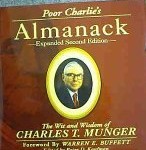
If I had to pick just one business book for folks to read, it would be this illustrated tome by Charlie Munger — Warren Buffett’s long-time right-hand man — with its folksy and entertaining tales of business and life (see Charlie Munger Quotes for a taste).
There’s plenty of Buffett tips in here too so you get two-for-one! …
3 comments so far (is that a lot?) | Continue Reading »
Wednesday, February 16th, 2011
Warren Buffett’s 3 Simple Tips On Who To Hire
Tweet 4 CommentsI’ve been thinking a lot about hiring lately.
I’m working on starting a new business and I also coach others on starting their own businesses – and hiring is perhaps the most important decision a business leader can make (you may recall how I previously wrote about a mishire costing you a cool $1 million).
I like formulas & frameworks and I’ve been keeping my eye out for a good one for hiring — I found a simple one from investor Warren Buffett.
He says there are just 3 criteria that every good hire should have: Integrity, Intelligence and Energy.
1) Integrity
Does this person consistently exhibit a soundness of character? Are they, in a word, honest?
One good tip on figuring this out is to use Warren Buffett’s “newspaper front page” test.
Let’s pretend the potential hire is named Bernard.
If a New York Times reporter had access to the work that Bernard did for you, would you comfortable opening up the paper tomorrow and reading their analysis of Bernard?
If the answer is yes, Bernard is probably of good integrity…if you’re thinking too much about that, you might have a problem with old Bernie.
A favorite quote of mine on honesty/integrity comes from Mark Twain:
“If you tell the truth you don’t have to remember anything.”
Another good quote from unknown sources is:
“Hire for character, don’t hire characters
2) Intelligence
Raw intelligence is important.
Did a person test well in a competitive environment (such as grades in University or on a standardized test like the SATs).
I just met with one engineer today in part because he scored a 1,480 on his SATs and that’s higher than most people I know.
But it doesn’t have to be academic intelligence.
It can be “Street Smarts” – The ability to quickly read situations and people.
Or it could be “Emotional Intelligence” – the skills to create optimal results in your relationship with yourself and others.
3) Energy
By energy, I couldn’t find Buffett’s definition of it but here’s mine:
Good energy in a hire is when they feel motivated about a task at hand.
For example, most people consider me high-energy about most things: I care deeply about new Internet businesses, hiring & making the world a better place – so when I’m working on those things, you’ll find me at a high-energy level.
But there are tasks that you’ll find me much lower energy on, such as paying my bills or filling out a rebate form to get $100 back for my contact lenses.
So, if you need help with your paperwork, please do not consider me a good candidate!
But If They Don’t Have Integrity, The Other Two Will Kill You
Now, ideally you want all three criteria — Integrity, Intelligence and Energy — to be met when hiring employees.
But there is one that trumps them all: Integrity.
Why?
The reason, as Buffett explains, is that if you have the other two: an intelligent person who is high-energy about what they’re doing, but they’re missing the third (they are low-integrity (e.g. dishonest)), then that is a Perfect Storm of financial disaster.
Case in point: Bernie Madoff (you like how I moved to the real -life Bernie from the hypothetical “Bernard”?).
Clearly, Bernie was an intelligent man – he had the respect of a Who’s Who of Wall Street people.
And he was high-energy at what he did– was able to talk 1,000’s of people into hiring him to manage their savings; and hid his fraud for what investigators believe was over 30 years!
He even duped a couple of very smart people I know.
And Bernie served on a number of boards (including Yeshiva University’s Business School and Gift of Life Bone Marrow Foundation) and was clearly a high-energy multi-tasker.
So, I think Bernie qualifes as an intelligent and energized person…but he was low-integrity…and he robbed people blind.
To recap, there are three things that a good hire (or anyone you work with) should possess:
- Integrity
- Intelligence
- Energy
But to save yourself time, make sure they have the first (Integrity) because the next two don’t matter without it.
